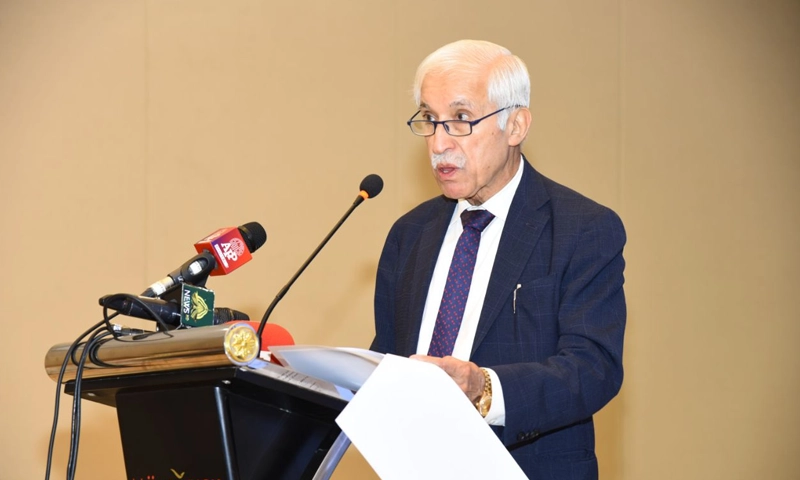- Web
- Feb 05, 2026
Minister highlights Pakistan’s investment potential at CAREC conference
-

- Web Desk
- May 30, 2025

ISLAMABAD: Federal Minister for Investment Qaiser Ahmed Sheikh on Friday highlighted Pakistan’s strategic commitment to economic reforms, digital transformation and regional trade integration.
Speaking at a panel discussion during second day of the fifth annual CAREC Institute Research Conference, held in collaboration with the University of Sargodha (UOS), he acknowledged CAREC’s instrumental role in promoting regional cooperation and enhancing trade connectivity.
Themed “CAREC Connectivity: Promoting Trade and Trade Facilitation,” the conference brought together a diverse group of national and international stakeholders.
Co-organizers of the event included the Islamic Development Bank (IsDB), Pakistan Single Window (PSW), Allama Iqbal Open University (AIOU), International Road Transport Union (IRU), Development Alternatives, Inc. (DAI), Sustainable Development Policy Institute (SDPI), Pakistan International Freight Forwarders Association (PIFFA), and the ECO Science Foundation (ECOSF).
The minister said this forum presented a valuable opportunity to explore investment potential and share our progress, adding “Pakistan, with support from the CAREC Institute, is actively pursuing reforms to simplify business processes, enhance transparency, and attract foreign direct investment.”
He acknowledged persistent concerns from international investors around bureaucratic complexity, assuring the audience that Pakistan’s Board of Investment (BOI) was taking concrete steps to modernize and streamline regulatory frameworks.
Also read: United US125 is a budget bike compared to Honda CG125 in Pakistan
“We’re aggressively digitizing procedures, from business registration to licensing, through platforms like the Pakistan Business Portal,” he said, adding that these efforts were aligned with CAREC’s vision of a digitally connected regional economy.
Highlighting macroeconomic improvements, the minister pointed to significant progress in inflation control, now down from 38 per cent to nearly zero, and a sharp reduction in the policy rate from 22 per cent to 11 per cent, signaling a more stable investment climate.
He credited flagship initiatives like the China-Pakistan Economic Corridor (CPEC) for advancing infrastructure and logistics, further reinforcing Pakistan’s position as a key trade and transit hub.
“We are actively addressing infrastructure bottlenecks and investing in regional connectivity to ensure seamless cross-border commerce,” he added.
Sheikh also underscored ongoing partnerships with development institutions, such as the Asian Development Bank, which provide vital technical assistance in trade logistics and regulatory reforms.
The minister praised CAREC for convening such a diverse and influential forum. “This platform strengthens our collective ability to design smarter investment strategies, drive regulatory innovation and position Pakistan as a reliable partner in regional economic integration,” he remarked.
He said Pakistan was a secure destination for investment, offering tremendous opportunities due to the government’s prudent economic policies in diverse fields, including the minerals sector.
Participating in the panel discussion, Ambassador of Kazakhstan to Pakistan Yerzhan Kistafin underscored the strategic importance of regional connectivity for Central Asia’s economic growth, particularly highlighting Kazakhstan’s evolving partnership with Pakistan.
As the world’s largest landlocked country, he said, Kazakhstan has no alternative but to strengthen ties within Central Asia and beyond – with Pakistan positioned as a critical link.
The envoy detailed successful multimodal trade routes through Pakistan’s ports to the UAE and Azerbaijan, affirming the viability of North-South corridors.
He noted a remarkable rise in bilateral trade with Pakistan, which grew from $50 million to $239 million, with potential to reach $14 billion.
Central to this vision, he said, was the transformation of Kazakhstan from a landlocked to a land-linked country, serving as a bridge between East and West.
Emphasizing digitalization, e-commerce, energy cooperation, and human capital development, Kistafin called for regulatory harmonization and a shared digital infrastructure among Central Asian states and Pakistan.
He said with Pakistan, during our last session of the Intergovernmental Joint Commission, it was agreed to establishing a consortium for transport and logistics between the two countries, besides a planned regional Business Council, aimed at facilitating G2G, B2B, and G2B cooperation.
“Successful Central Asia means a successful Kazakhstan – and Pakistan is essential to that success,” he added.
Earlier, participants at another panel discussion on “Connecting CARE to the GCC via Intermodal Transport—Opportunities and Challenges” said that Pakistan has significant potential to become a regional transit hub due to its strategic geographical location and the availability of shorter trade routes.
They emphasized that while Pakistan’s location offers natural advantages, there was a pressing need to develop a comprehensive ecosystem to enable the country to realize this potential.
They stressed the importance of cohesive integration among various channels responsible for facilitating trade, pointing out that only a well-coordinated approach can unlock Pakistan’s regional connectivity capabilities.
The panelists also called for the clarification of the legal framework surrounding transit trade.
They also recommended the creation of a separate Ministry of Logistics, noting that such a dedicated ministry would help foster a conducive atmosphere for facilitating transit trade, aligning policy and infrastructure development under one umbrella.
Given the increasing trade links between China, Central Asian countries, and the Gulf Cooperation Council (GCC), the speakers underlined the importance of establishing an intermodal transport system.
They argued that an integrated network involving multiple modes of transport is imperative for handling growing trade volumes efficiently.
The discussion also touched on Pakistan’s participation in the International Road Transport (TIR) system, which the country joined in 2017. While recognizing this as a positive step, panelists pointed out that much remains to be done to fully benefit from the initiative. They highlighted that the TIR system would streamline international transit by simplifying customs procedures and employing an international guarantee system.
The panel featured experts including moderator Tatiana Rey-Bellet, Director TIR and Transit at the International Road Transport Union (IRU); Shoaib Khakwani, General Manager TIR at National Logistics Cell; Shaukat Abbas, General Manager at Gerry’s Logistics; Burak E Erdogan, Expert at TOBB-Department of Transport & Logistical Systems TIR Operations Division; and Max, CEO and Connectivity and Trade Facilitation Expert from Singapore.




